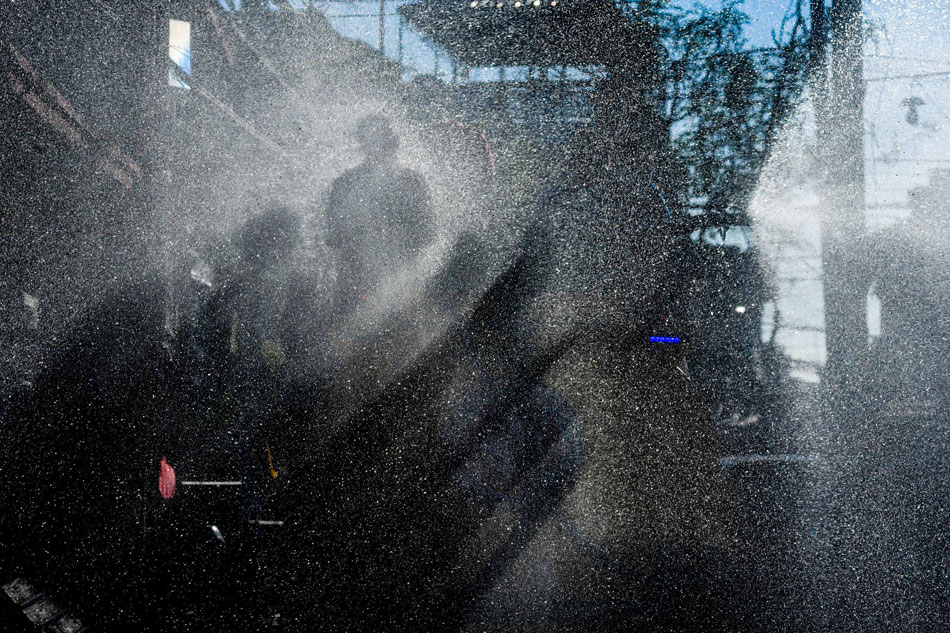Why DOH warns against spraying, misting to disinfect surroundings | ABS-CBN
ADVERTISEMENT

Welcome, Kapamilya! We use cookies to improve your browsing experience. Continuing to use this site means you agree to our use of cookies. Tell me more!
Why DOH warns against spraying, misting to disinfect surroundings
ABS-CBN News
Published Apr 10, 2020 05:32 PM PHT
|
Updated Apr 10, 2020 07:03 PM PHT
MANILA — While local government units have been using disinfection tents because of the COVID-19 pandemic, the Department of Health on Friday said this method might not be a good idea.
MANILA — While local government units have been using disinfection tents because of the COVID-19 pandemic, the Department of Health on Friday said this method might not be a good idea.
“DOH does not recommend spraying or misting. There is no evidence to support that spraying of surfaces or large scale misting of areas, indoor or outdoor with disinfecting agents, kills the virus,” the agency said in an announcement.
“DOH does not recommend spraying or misting. There is no evidence to support that spraying of surfaces or large scale misting of areas, indoor or outdoor with disinfecting agents, kills the virus,” the agency said in an announcement.
The department said spraying or misting can “cause pathogens to be dispersed further during spraying.”
The department said spraying or misting can “cause pathogens to be dispersed further during spraying.”
It can also result in skin irritation or the inhalation of chemicals, as well as environmental pollution.
It can also result in skin irritation or the inhalation of chemicals, as well as environmental pollution.
ADVERTISEMENT
In some cities, sodium hypochlorite or household bleach is mixed with water and sprayed on streets using firetrucks, while people are made to enter disinfecting tents before being allowed inside buildings.
In some cities, sodium hypochlorite or household bleach is mixed with water and sprayed on streets using firetrucks, while people are made to enter disinfecting tents before being allowed inside buildings.
“Marami na tayong nakuhang reports na ang mga tao nakakuha ng sakit sa balat o hinihika,” Health Undersecretary Maria Rosario Vergeire said in an ABS-CBN News interview.
“Marami na tayong nakuhang reports na ang mga tao nakakuha ng sakit sa balat o hinihika,” Health Undersecretary Maria Rosario Vergeire said in an ABS-CBN News interview.
(We have received a lot of reports of people complaining about skin problems and asthma.)
(We have received a lot of reports of people complaining about skin problems and asthma.)
She said the DOH advisory is based on evidence that shows disinfection can result in asthma or dermatitis.
She said the DOH advisory is based on evidence that shows disinfection can result in asthma or dermatitis.
Instead, the DOH said it is better to “soak objects or disinfect surfaces to kill the virus.”
Instead, the DOH said it is better to “soak objects or disinfect surfaces to kill the virus.”
Last week, global experts weighed in on the practice of mass disinfection being done in different countries.
Last week, global experts weighed in on the practice of mass disinfection being done in different countries.
"I don't believe it adds anything to the response and could be toxic on people. The virus does not survive for long in the environment and people do not generally touch the ground,” Dale Fisher, an infectious diseases expert in Singapore, was quoted saying.
"I don't believe it adds anything to the response and could be toxic on people. The virus does not survive for long in the environment and people do not generally touch the ground,” Dale Fisher, an infectious diseases expert in Singapore, was quoted saying.
ADVERTISEMENT
ADVERTISEMENT



